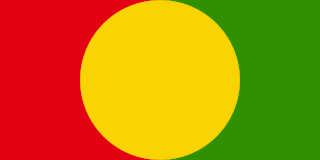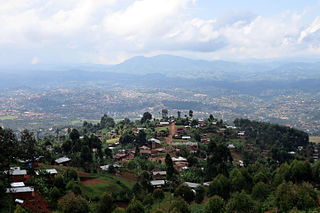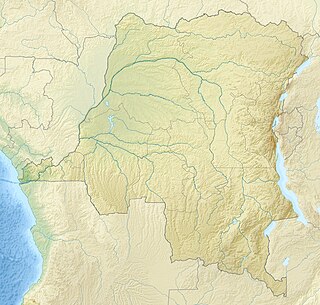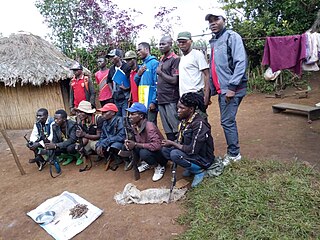Related Research Articles

North Kivu is a province bordering Lake Kivu in the eastern Democratic Republic of the Congo. Its capital is Goma.

South Kivu is one of 26 provinces of the Democratic Republic of the Congo. Its capital is Bukavu.

Bukavu is a city in eastern Democratic Republic of the Congo (DRC), lying at the extreme south-western edge of Lake Kivu, west of Cyangugu in Rwanda, and separated from it by the outlet of the Ruzizi River. It is the capital of the South Kivu province and as of 2012 it had an estimated population of 806,940.

Lake Kivu is one of the African Great Lakes. It lies on the border between the Democratic Republic of the Congo and Rwanda, and is in the Albertine Rift, the western branch of the East African Rift. Lake Kivu empties into the Ruzizi River, which flows southwards into Lake Tanganyika.

The term Mayi-Mayi or Mai-Mai refers to any kind of community-based militia group active in the Democratic Republic of the Congo (DRC), formed to defend their local territory against other armed groups. Most were formed to resist the invasion of Rwandan forces and Rwanda-affiliated Congolese rebel groups, but some may have formed to exploit the war for their own advantage by looting, cattle rustling or banditry.

Goma is the capital of North Kivu province in the eastern Democratic Republic of the Congo. It is located on the northern shore of Lake Kivu, next to the Rwandan city of Gisenyi. The lake and the two cities are in the Albertine Rift, the western branch of the East African Rift system. Goma lies only 13–18 km (8.1–11.2 mi) south of the active Nyiragongo Volcano. The recent history of Goma has been dominated by the volcano and the Rwandan genocide of 1994, which in turn fuelled the First and Second Congo Wars. The aftermath of these events was still having effects on the city and its surroundings in 2010. The city was captured by rebels of the March 23 Movement during the M23 rebellion in late 2012, but has since been retaken by government forces.

The Democratic Forces for the Liberation of Rwanda is an armed rebel group active in the eastern Democratic Republic of the Congo. An ethnic Hutu group opposed to the ethnic Tutsi influence, the FDLR is one of the last factions of Rwandan génocidaires active in the Congo. It was founded through an amalgamation of other Hutu groups in September 2000, including the former Army for the Liberation of Rwanda (ALiR), under the leadership of Paul Rwarakabije. It was active during the latter phases of the Second Congo War and the subsequent insurgencies in Kivu.

Butembo is a city in North Kivu, in the north eastern Democratic Republic of Congo, lying west of the Virunga National Park. The city is an important commercial centre with large markets, a cathedral, multiple large hospitals, and an airport. The city is located in a region known for tea and coffee growing. As of 2013 it had an estimated population of 670,285, making it the second largest city in North Kivu.

The Kivu conflict began in 2004 in the eastern Congo as an armed conflict between the military of the Democratic Republic of the Congo (FARDC) and the Hutu Power group Democratic Forces for the Liberation of Rwanda (FDLR) in the Democratic Republic of the Congo. It has broadly consisted of three phases, the third of which is an ongoing conflict. Prior to March 2009, the main combatant group against the FARDC was the National Congress for the Defence of the People (CNDP). Following the cessation of hostilities between these two forces, rebel Tutsi forces, formerly under the command of Laurent Nkunda, became the dominant opposition to the government forces.

The 2008 Lake Kivu earthquake shook several countries in Africa's Great Lakes region at 07:34:12 (GMT) on February 3. It measured 5.9 on the moment magnitude scale. The epicentre was 20 kilometres (12 mi) north of Bukavu at Lake Kivu in the Democratic Republic of Congo.
Laurent Nkunda is a former General in the Armed Forces of the Democratic Republic of Congo (DRC) and is the former warlord operating in the province of Nord-Kivu, sympathetic to Congolese Tutsis and the Tutsi-dominated government of neighbouring Rwanda. Nkunda, who is himself a Congolese Tutsi, commanded the former DRC troops of the 81st and 83rd Brigades of the DRC Army. He speaks English, French, Swahili, Kinyarwanda, Lingala and Kinande. On January 22, 2009, he was put under house arrest in Gisenyi when he was called for a meeting to plan a joint operation between the Congolese and Rwandan militaries.
A supercell is a thunderstorm with a deep, persistently rotating updraft.

The 2002 Kalehe earthquake occurred on October 24 at 06:08 UTC. This earthquake had a magnitude Mw 6.2, and the epicenter was located in Democratic Republic of the Congo, near Lake Kivu. Two people were reported dead. Building damage was reported in Goma, Lwiro, Kalehe, and Mugeri. The seismicity, volcanism, and uplift in the basin of Lake Kivu delimits the rift of a tectonic plate. Lake Kivu belongs to the western branch of the East African Rift System (EARS). The western branch is usually divided into several segments, and Lake Kivu belongs to the northern segment.

The International Criminal Court investigation in the Democratic Republic of the Congo or the situation in the Democratic Republic of the Congo is an ongoing investigation by the International Criminal Court (ICC) into crimes committed in the Democratic Republic of the Congo (DRC) during the Second Congo War and its aftermath, including the Ituri and Kivu conflicts. The war started in 1998 and despite a peace agreement between combatants in 2003, conflict continued in the eastern parts of the country for several years. In April 2004 the government of the DRC formally referred the situation in the Congo to the International Criminal Court, and in June 2004, prosecutor Luis Moreno Ocampo, formally opened an investigation. To date, arrest warrants have been issued for:
Chambucha is a location in Walikale Territory, North Kivu, Democratic Republic of the Congo.
Lubero Territory is a territory in North Kivu, Democratic Republic of the Congo.

The Allied Democratic Forces insurgency is an ongoing conflict waged by the Allied Democratic Forces in Uganda and the Democratic Republic of the Congo, against the governments of those two countries. The insurgency began in 1995, intensifying in 2013, resulting in hundreds of deaths. The ADF is known to currently control a number of hidden camps which are home to about 2,000 people; in these camps, the ADF operates as proto-state with "an internal security service, a prison, health clinics, and an orphanage" as well as schools for boys and girls.
The Land Forces, also called the Congolese army, are the land warfare component and the largest branch of the Armed Forces of the Democratic Republic of the Congo (FARDC).
Jaynet Désiré Kabila Kyungu is the daughter of Laurent-Désiré Kabila, the former president of the Democratic Republic of Congo and twin sister of Joseph Kabila, the former President. Kabila was elected as a member of the Parliament of the Democratic Republic of the Congo in 2011, the same year as her other brother Zoé Kabila. Document leaks in 2016 revealed that she is a part-owner of a major Congolese telecom company through offshore subsidiaries.

Raïa Mutomboki or Raiya Mutomboki are a militia operating in the Kivu provinces of eastern Democratic Republic of the Congo. The group formed in 2005 to fight against Rwandan Hutu groups such as the Democratic Forces for the Liberation of Rwanda (FDLR) as part of the Kivu conflict.
References
- 1 2 "MTN seeking DRC presence?". Telegeography.com. 2008-09-22. Retrieved 2016-09-30.
- ↑ "Supercell Sprl (Congo, Democratic Republic of) - Network Information". 2002-06-02. Archived from the original on 2002-06-02. Retrieved 2017-08-16.
| This article about a telecommunications company is a stub. You can help Wikipedia by expanding it. |
| This Democratic Republic of the Congo-related article is a stub. You can help Wikipedia by expanding it. |